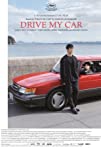Eye For Film >> Movies >> Drive My Car (2021) Film Review
Drive My Car
Reviewed by: Jennie Kermode

Yûsuke (Hidetoshi Nishijima) loves his car. It’s an old model, a right hand drive vehicle in a country where everyone drives on the left, and he takes great care of it. It worries him that his wife, the playwright Oto (Reika Kirishima), doesn’t pay enough attention to the road when she’s behind the wheel. When he moves to a small island to take up a residency, directing Uncle Vanya, he is appalled to hear that for insurance reasons he must allow a professional driver, 23-year-old Misaki (Tôko Miura), to drive it for him, but she will surprise him – in a lot of ways.
Between the film’s opening and Yûsuke’s first meeting with Misaki, a good deal happens. Several years, and almost half an hour of viewing time, elapse before we see the opening credits. It’s difficult to say too much about this without spoilers, but to sum up, Yûsuke is alone when he reaches the island, and is trying to find a way to reinvent himself, to find fresh meaning in life. Although the plot unravels quite differently from that of Chekov’s masterpiece – and viewers need not worry that it will insult their intelligence with a parallel of that age-gap romance – it explores similar themes around purposelessness, lack of control and unwanted yet inescapable inward journeys.
Catalysing this is a fourth central character, the turbulent young actor Takatsuki (Masaki Okada) whom Yûsuke casts as Vanya. Quite open about his obsession with Oto, Takatsuki strains to get close to the director, as if seeking indirect intimacy with her. He is one of those actors whose emotional openness is accompanied by poor impulse control, and he easily becomes aggressive; he also comes across as remarkably shallow, but Yûsuke is convinced that there’s something else going on underneath, and that his very resistance to exploring it makes him the perfect choice for one of Chekov’s most uncomfortable characters. Furthermore, this casting choice keeps Yûsuke from having to play Vanya himself, something which he is afraid of, and he uses the young man to try and escape intimacy himself.
Slow to build and with an assembly of characters who are all more complex than they seem on the surface, Drive My Car exemplifies Japan’s growing body of literary cinema, and is its submission for Best Film Not In the English Language at the 2022 Oscars. It’s a film shot through with mysteries which may be as much a product of supposition and overthinking as of circumstance. Misaki, a working class woman who approaches life first and foremost from a pragmatic standpoint, resists Yûsuke’s description of Oto as mysterious, seeing much more straightforward explanations for her behaviour and implying that the director is letting romantic notions get in the way of respecting her as a human being. As she becomes confident in Yûsuke’s presence, she speaks with increasing boldness, her simple yet weighty words cutting through a film which is also rich in linguistic complexity. Japanese, Korean, English and Korean Sign Language all have important roles to play here, and their interplay points up how easily meaning can change as one person’s words are interpreted by another, even when they are using the same tongue.
Despite the conscious theatricality of some of its scenes, Director Ryûsuke Hamaguchi, who exploded onto the scene in 2015 with Happy Hour and went on to impress still more with Asako I & II and Wheel of Fortune and Fantasy, resists the temptation to steer too close to the text he’s referencing and instead delivers a character-focused piece. Where it veers closest to Chekov is in its depiction of characters whose refusal to see one another clearly, and to recognise their similarities, limits their understanding of themselves and has an isolating effect. The bond that forms between Yûsuke and Misaki feels like a furious assault upon this, externally quiet though it may be. Rooted in forgiveness, it’s a renewed struggle for life.
Reviewed on: 07 Dec 2021
















